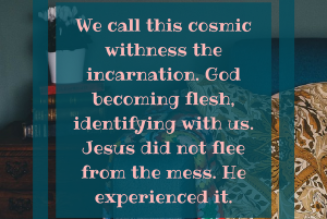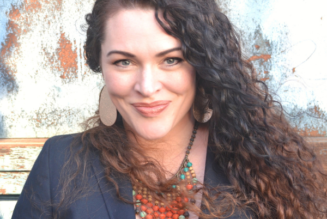There it is, the hollow emptiness of silence. The slight sliding of your hand as pen scratches across a lined journal page. The pressure in your throat as you whisper silent pleas at God. Prayer can mean talking to God and then feeling only a cathartic release. You pray with expectation that God is present, but in a distant-sort-of-way. To a Lord who feels, maybe, intimidating, and a little aloof, a Lord who turns towards you because it is his duty to turn, not because he wants to.
I get it.

Praying can feel like a mighty lonely thing then. A desperate, sad affair. Because if we feel God is distant from us, but we pray anyway, it is because we are at the end of our rope and don’t know what else to do. We are in a fix; we are messed up; we need help and a sovereign Lord who will care. And we read in the Bible that he cares, he loves, he sacrifices, he is completely all-in in his love for us. But it can still feel like he is a God that stays on the pages in our Bible when we pray, when we are on our knees in our living room, when we are at the kitchen sink crying those help me prayers.
No matter how earnestly, in prayer, we choose our words; no matter how often we read the Bible; no matter how many songs we sing in worship or how dutifully we complete our homework for Bible study, God feels far away when we don’t hear him answer back when we pray.
The book of Hebrews teaches us of the faith of the persecuted, the hungry, the tired, the weak. It teaches us of the perseverance of faith, of continuing to pursue God and believe in his goodness and his presence even when it cannot be tangibly or even, readily, seen. Abel, Abraham, Enoch, Sarah, Jacob, Joseph, Moses . . . they all continued to have faith even though they, “commended through their faith, did not receive what was promised, since God had provided something better for us, that apart from us they should not be made perfect” (Hebrews 11: 39-40).
Further on in Hebrews we are reminded of the One who founds and perfects our faith. We learn that following God—believing he is with us and he loves us–is a decision. And with that decision is a desire to lay aside the sin that prevents us from living, praying, in faith.
Therefore, since we are surrounded by so great a cloud of witnesses, let us also lay aside every weight, and sin which clings so closely, and let us run with endurance the race that is set before us, looking to Jesus, the founder and perfecter of our faith, who for the joy that was set before him endured the cross, despising the shame, and is seated at the right hand of the throne of God (Hebrews 12:1-2).
And this gets me thinking: I wonder if confessing our sin precipitates the transformation of prayer life. I wonder if surrendering our sin, in faith, to God, is necessary for prayer to stop being static, rote, impersonal. I wonder if this is how prayer changes from talking to God to listening for him. I wonder if this is how prayer changes to conversation? After all, he is the Word come down.

In the beginning was the Word, and the Word was with God, and the Word was God (John 1:1).
The continually laying down our sin, letting our old self die, is neither fun nor easy. I know. But when I slow down and I get quiet. When I think about God and how I want to be more like Him, I want to confess the ways I have loved other things more than him. And when I confess, I am thinking about him, and when I think about him, I think about his demeanor and his face. I think about his character and his love. I think about how he wants to be with me, despite all that I’ve done. And that makes me want to be with him more, which prompts me to want to spend time with him and listen, and expect, because he loves me, he wants to speak.
And sometimes God’s speaking is not in words. And sometimes God’s speaking is not even a whisper I sense inside me. Sometimes his words to me–his voice–is his presence: his eyes, his arms spread out to greet me, his extended hand, his walking beside me, his catching each tear and staying with me, no matter what.
A conversation with God can be an unspoken one, for his words are more than words. They are life and light. They are beginning. The word is God (John 1:1).
So, how do we converse with God? How do we not?
His whispers to you, his presence with you, his ongoing conversation with you are ones he wants you never, ever, to forget. Are you excited to listen?
Do you think of prayer as a conversation? When you have prayed lately, has God felt close or far away?
For Loop Poetry Project, consider writing a poem on the topic of distance–distance in the physical sense or the emotional kind. Consider the topic of boundaries you place around people or ideas–borders and walls or wide-open spaces and possibilities. How do your expectations for a deeper relationship with God affect your relationships and your dreams? How do you view the world–and yourself and others–when you have a mindset of optimism and hope or one of pessimism and doubt? Or, what is it like to have both?

Share your poem below, in the comments. I can’t wait to read your words! And/or share it with the kind group of sister poets at Loop Poetry Project who are writing to heal. We would love to see you over there!
Love,
Jennifer
The Rebuilding
Who is to say how tall
the walls will be
when they crumble
around you, a steep
crashing until the sky shouts
them down. A desolate
promise to rebuild
the ruins of you until
light blankets every crumb,
every torn place pulled
from the wreckage.
You have the tools.
Pull yourself up now.
This post appeared originally at jenniferjcamp.com









